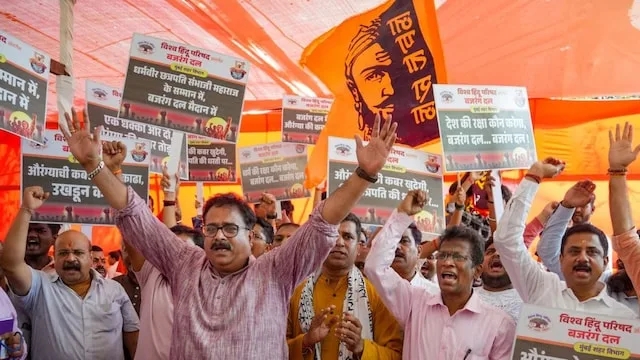Aurangzeb's demonization serves political purposes, 'intimidating' Muslims through issues like cow-beef, love jihad, land jihad
Since the demolition of the Babri Mosque by the RSS Combine in 1992, a particular version of history, focusing on kings and their religions, is being selectively imposed on the collective social consciousness. Taking this further, communal forces are now linking history with nationalism. Interestingly, the history of the era of kingdoms is being tied to nationalism, ignoring the fact that the nation-state is a modern concept, and the idea of India emerged parallel to the struggle against colonial powers.
Communal forces are portraying Hindu kings who fought against Muslim rulers as patriots, great nationalists, and national icons. Nathuram Godse, who assassinated Mahatma Gandhi, in his book "May It Please Your Honour", described Gandhi as a "pygmy" compared to the nationalism of Chhatrapati Shivaji Maharaj or Maharana Pratap. Today, those who share Godse's ideology are reiterating these views with greater intensity.
Recently, Uttar Pradesh Chief Minister Adityanath Yogi sharply criticized those glorifying historical invaders, calling it an act of treason that "new India" will not tolerate. His remarks coincided with rising demands for the removal of Mughal ruler Aurangzeb's tomb in Maharashtra's Chhatrapati Sambhajinagar district. Similarly, Dattatray Hosabale, the Sarkaryavah (General Secretary) of the RSS, questioned whether idolizing figures who opposed India's ethos was appropriate. He pointed out that advocates of the Ganga-Jamuni culture (a fusion of Hindu and Islamic cultural elements) have never idolized Dara Shikoh, Aurangzeb's elder brother and a pioneer of such ideas.
Aurangzeb is often demonized as an invader and a cruel villain. However, was he truly an invader? Aurangzeb inherited the empire from his father, Shah Jahan. The Mughal dynasty began with Babur, who ruled Kabul. Babur was invited by Rana Sanga to defeat Ibrahim Lodi, the ruler of Delhi. However, Babur ended up fighting both Rana Sanga and Ibrahim Lodi to establish his rule over the Delhi Empire.
Before Babur, India saw invasions by Greeks, Kushans, Huns, and Shakas, who eventually became part of the local populace. The Mughals were not the only rulers who came to India; the Khiljis, Ghulams, and Ghaznavids also arrived after defeating local kings. India, as we know it today, did not exist as a unified nation. Kings fought each other for power and wealth, while interactions with diverse groups like the Shakas, Huns, Kushans, and Ahoms in the East created the syncretic culture prevalent here.
Who represents the icon of the Indian nation? Yogi and Godse present Shivaji and Rana Pratap as national icons. Shivaji's administration included many Muslim generals and officers. He fought against Aurangzeb, whose army was led by Mirza Raja Jai Singh. Rana Pratap's bravery at Haldighati is commendable, but does it symbolize a fight for Indian nationalism? His army of 3,000 included 1,000 Pathans led by Hakim Khan Sur. On the other side, Akbar's army was commanded by Man Singh. The battle was not about nationalism but about mansab (rank and revenue). Even if Hindu nationalists wish to present those who fought against Muslims as national icons, the reality is more complex—it was kings versus kings, not Hindus versus Muslims.
Not all Muslim kings were cruel, nor were all Hindu kings messengers of peace. Emperor Ashoka is infamous for the Kalinga War. The Chola kings' wars with the Chalukyas were brutal; for instance, Rajendra Chola's army decapitated the Chalukya general Samudra Raj and mutilated his daughter.
Aurangzeb's demonization serves political purposes, intimidating and marginalizing Muslims through issues like cow-beef, love jihad, and land jihad. Some Muslims, facing violence and ghettoization, find a semblance of pride in Aurangzeb. However, the primary goal of demonizing Aurangzeb is political—to target today's Muslim community.
History can be presented in various ways. Hindu communalists overemphasize kings to obscure the brutalities of the caste-Varna hierarchy and the subjugation of women. Dr. B.R. Ambedkar viewed Indian history as a battle between Buddhism and Brahmanism. According to him, Buddhism emerged as a revolutionary force against Brahmanical caste-Varna values, spreading as a major religion in India and Southeast Asia under Emperor Ashoka. However, this revolution was followed by a counter-revolution led by Pushyamitra Shunga, who physically eradicated Buddhists, causing Buddhism to disappear from India until Ambedkar revived it.
The colonial period's social reforms mitigated some of the brutalities inflicted on Dalits and women, though these issues persist today. Icons like Raja Ram Mohan Roy, Jyotirao Phule, and Babasaheb Ambedkar, who fought against the caste-Varna system, deserve recognition. Where do Bhagat Singh, Ashfaqulla Khan, Gandhi, Maulana Azad, Sardar Patel, Nehru, and Subhas Chandra Bose fit in the narrative of Indian icons?
The overemphasis on the cruelties of Muslim kings serves two purposes for the Hindu nationalist project: targeting religious minorities and obscuring the Brahminical system's oppression of weaker sections of society. While leaders like the Prime Minister and the Chief Minister of Maharashtra praise films like *Chhava*, they avoid promoting films that highlight atrocities against Dalits and women. For instance, BJP leader Vijayaraje Scindia once upheld the practice of sati (the immolation of widows). Today, leaders like Yogi, Fadnavis, and Hosabale continue to exploit communal narratives.


Comments